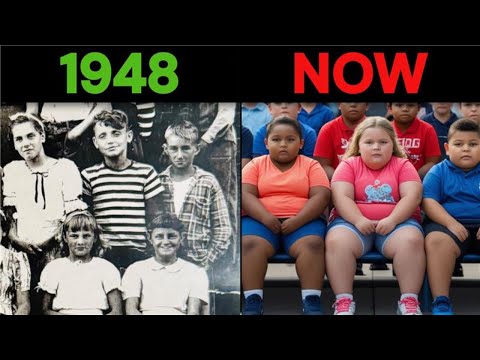Why are we feeding our kids ultra-processed foods? In 1948, the childhood obesity rate was less than 1%, and food allergies, asthma, and autism were virtually non-existent. Discover the detrimental health consequences of the ultra-processed food diet in this video.
0:00 Introduction: Obesity, disease, and diet in 1948
3:46 Obesity in children
4:10 Ultra-processed foods
4:34 The problem with the ultra-processed food diet
6:07 Ultra-processed food calories today
6:29 Seed oils
7:00 Refined starches
When my father was a child in 1948, he recalls a different way of life. Sugary cereals like Fruit Loops, Captain Crunch, and Fruity Pebbles did not line the aisles of the grocery store. Children did not have mid-morning snacks at school and were told not to spoil their appetites by eating before dinner.
Saturated fats were not demonized as they are today. Lard and tallow were found in every kitchen, and red meat was a dietary staple. Most people had gardens and relied on the skill of canning to get them through the winter.
Obesity and chronic disease in childhood were uncommon, while childhood obesity, food allergies, asthma, and autism plague the children of today!
The largest category of ultra-processed foods are snack foods. The problem with snacking is that you spike insulin every time you eat. Carbohydrates create the most significant spike in insulin. Not only are we snacking, but we’re snacking on the worst foods!
The pancreas is constantly working to pump out insulin to remove sugar from the blood. This eventually leads to insulin resistance, which is behind almost every chronic illness, including a fatty liver, high blood pressure, diabetes, obesity, inflammatory diseases, mood disorders, dementia, and more.
In 1948, we did not have not have ultra-processed food calories. Today, 65% of the teenage diet comes from ultra-processed food calories. This number is around 50% for adults and 45% for toddlers.
Seed oils, such as soy, corn, cottonseed, and canola, are the worst ultra-processed food ingredients. Around 25% to 30% of all our calories come from seed oils.
Grain-based starches generate 220 billion dollars per year! Highly processed industrial starches such as modified food starch, modified cornstarch, and maltodextrin spike blood sugar—often higher than consuming sugar does!
Dr. Eric Berg DC Bio:
Dr. Berg, age 59, is a chiropractor who specializes in Healthy Ketosis & Intermittent Fasting. He is the author of the best-selling book The Healthy Keto Plan, and is the Director of Dr. Berg Nutritionals. He no longer practices, but focuses on health education through social media.
Follow Me On Social Media:
YouTube: https://www.youtube.com/@Drberg/
YouTube Shorts: https://www.youtube.com/@UCpWhiwlOPxOmwQu5xyjtLDw
Facebook: https://www.facebook.com/drericberg
Instagram: https://www.instagram.com/drericberg/
Spotify Podcast: 🎧 https://drbrg.co/DrBerg-Spotify
TikTok: https://www.tiktok.com/@drbergofficial
Disclaimer:
Dr. Eric Berg received his Doctor of Chiropractic degree from Palmer College of Chiropractic in 1988. His use of “doctor” or “Dr.” in relation to himself solely refers to that degree. Dr. Berg is a licensed chiropractor in Virginia, California, and Louisiana, but he no longer practices chiropractic in any state and does not see patients, so he can focus on educating people as a full-time activity, yet he maintains an active license. This video is for general informational purposes only. It should not be used to self-diagnose, and it is not a substitute for a medical exam, cure, treatment, diagnosis, prescription, or recommendation. It does not create a doctor-patient relationship between Dr. Berg and you. You should not make any change in your health regimen or diet before first consulting a physician and obtaining a medical exam, diagnosis, and recommendation. Always seek the advice of a physician or other qualified health provider with any questions you may have regarding a medical condition.
#health #keto #ketodiet #weightloss #ketolifestyle #intermittentfasting #lowcarb
Thanks for watching! I hope this increases your awareness about the problems with our modern high-carbohydrate diet. I’ll see you in the next video.



